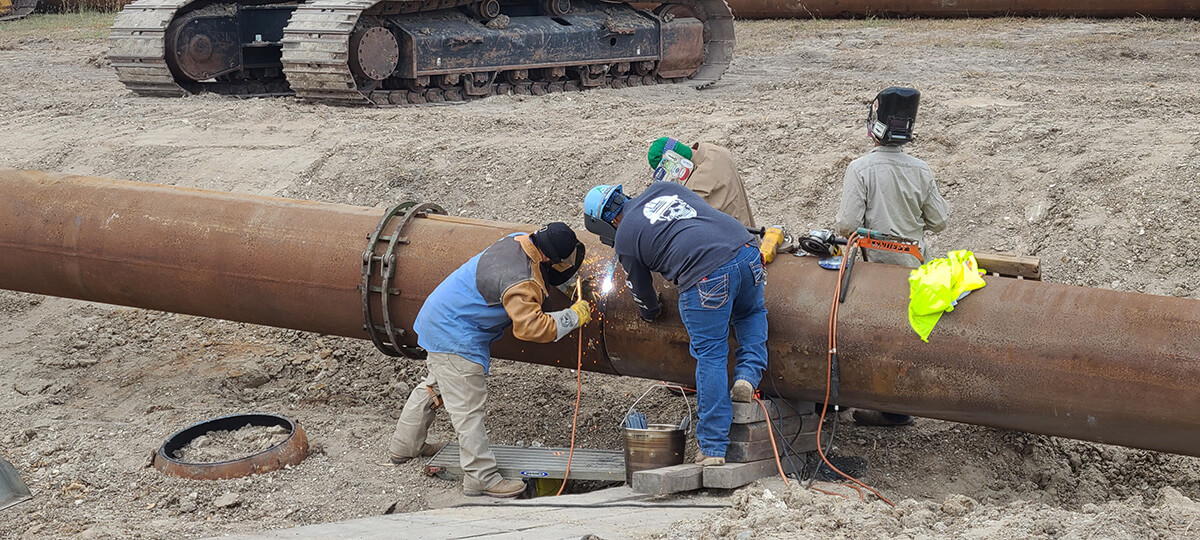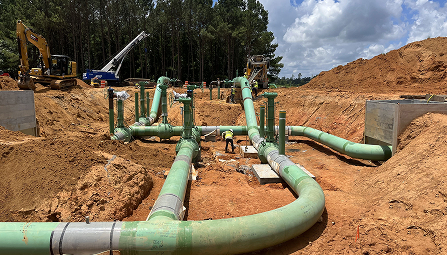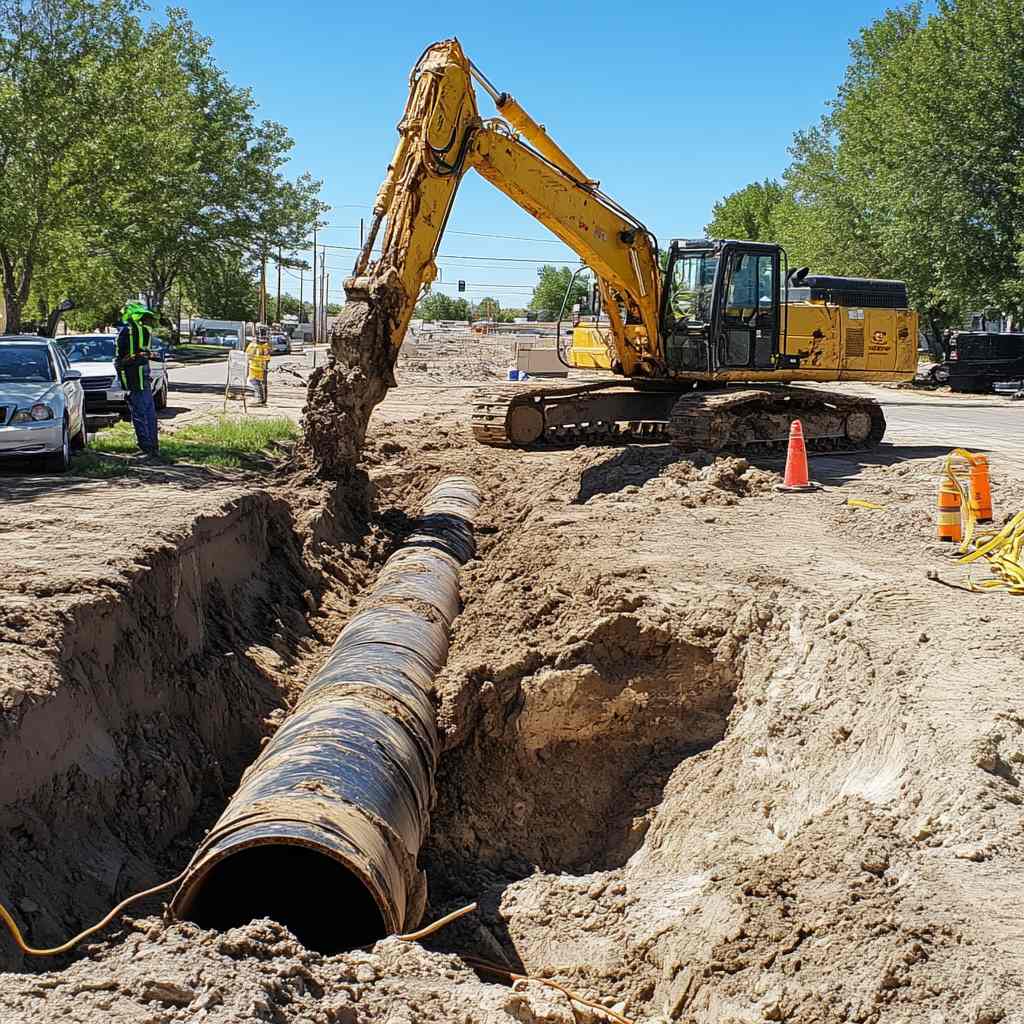Cost Analysis Guide for Pipeline Construction Services Projects
The Vital Overview to Understanding Pipeline Construction Services and Their Value
Pipeline Construction services are basic to the transport of vital resources such as oil, gas, and water. These solutions entail precise preparation and implementation, sticking to stringent safety and environmental standards. As the sector adapts to contemporary challenges, understanding its components and implications becomes increasingly vital. What aspects add to the growing relevance of these services in today's economy? The adhering to areas will discover these essential aspects.
Overview of Pipeline Construction Services
Pipeline Construction solutions encompass an array of activities crucial for the installment and maintenance of pipes utilized to transport different substances, consisting of water, oil, and gas. These services are essential for guaranteeing the secure and efficient activity of sources from one location to an additional. The process commonly begins with detailed planning and layout, which thinks about governing demands, environmental considerations, and logistical obstacles.
When preparation is complete, excavation and grading of the land are performed to prepare the website for Pipeline installation. This is complied with by the actual laying of the pipelines, which includes welding or signing up with areas together to produce a constant circulation course. After installation, strenuous screening is performed to assure stability and safety and security. Upkeep solutions are likewise given to deal with any kind of concerns that may emerge with time. Generally, Pipeline Construction services play a pivotal duty in supporting facilities for power and water distribution.
Trick Components of Pipeline Construction
A successful Pipeline Construction task counts on several essential parts that assure the efficient and safe installation of the Pipeline system. Initially, comprehensive site evaluations are crucial, as they determine the ecological and geographical elements that may influence Construction. Next, the option of appropriate products, such as fittings and pipelines, is vital for safeguarding durability and compatibility with the transported materials.
Furthermore, advanced Construction techniques, consisting of trenchless modern technology and directional drilling, improve performance and minimize ecological effect. Reliable job monitoring is one more vital component, coordinating labor, devices, and timelines to satisfy job goals.
Furthermore, communication among stakeholders, including designers, service providers, and regional authorities, guarantees placement on job specifications and needs. Comprehensive top quality control measures throughout the Construction process make sure conformity with industry requirements and make best use of the Pipeline's operational life expectancy. Jointly, these parts form the backbone of an effective Pipeline Construction task.
Safety Specifications and Laws in Pipeline Construction

Regulatory bodies, such as the Occupational Security and Health Administration (OSHA) and the Pipeline and Hazardous Products Safety Management (PHMSA), set forth details requirements that control Construction methods. These consist of procedures for devices usage, employee training, and emergency situation feedback treatments. By applying these standards, Construction companies not only safeguard their workers however likewise safe public trust fund. Inevitably, strenuous safety and security measures add to the lasting success of Pipeline tasks, guaranteeing they fulfill both ecological and operational expectations.
Environmental Considerations in Pipeline Projects

Ecological factors to consider are integral to the preparation and implementation of Pipeline jobs. These tasks need to evaluate prospective impacts on communities, water resources, and neighborhood wild animals. Conducting extensive environmental impact assessments (EIAs) is vital, allowing stakeholders to identify and minimize dangers before Construction begins.
Safeguarding sensitive locations, such as environments and marshes, often needs carrying out details style attributes or alternate transmitting to reduce disturbance. Additionally, Pipeline drivers are entrusted with creating strategies for stopping spills and redirected here leakages, which can have damaging effects on the atmosphere.
Involvement with regional neighborhoods is vital, as public issues can cause task alterations that enhance environmental management. Compliance with laws established by ecological firms ensures that jobs meet sustainability criteria, cultivating an equilibrium in between infrastructure demands and eco-friendly conservation. Inevitably, addressing environmental factors to consider not just safeguards nature but likewise advertises community count on and task practicality.
The Function of Technology in Pipeline Construction
Modern technology plays an essential duty in contemporary Pipeline Construction, enhancing efficiency and accuracy. Advanced evaluating strategies permit specific preparation and execution, minimizing environmental impact and job hold-ups. In addition, the integration of automation and robotics enhances operations, decreasing labor expenses and enhancing security on Construction sites.
Advanced Checking Methods
Advanced evaluating basics techniques play an important function in the effective implementation of Pipeline Construction projects. These techniques leverage advanced technology to guarantee accurate mapping and analysis of the terrain where pipelines will be mounted. Strategies such as Geographic Details Equipment (GIS), LiDAR (Light Detection and Ranging), and 3D modeling allow engineers to imagine and analyze the landscape, recognizing environmental issues and prospective challenges. By making use of these innovative devices, teams can improve accuracy in placing and placement, substantially lowering the danger of errors throughout Construction. Furthermore, real-time data collection permits instant modifications and informed decision-making throughout the task lifecycle. Eventually, these checking technologies add to enhanced effectiveness, safety, and sustainability in Pipeline Construction efforts.
Automation and Robotics

Economic Effect of Pipeline Framework
Pipeline facilities plays a necessary function in assisting in and shaping regional economic situations trade. By giving a trustworthy means of moving oil, gas, and various other commodities, pipelines reduce transport expenses and boost supply chain effectiveness. This infrastructure brings in financial investment, boosts task development, and cultivates financial growth in bordering areas.
The Construction and upkeep of pipelines contribute substantially to neighborhood economic climates, creating countless employment opportunities in different markets, from design to labor. The increase of work frequently leads to boosted costs in regional organizations, further strengthening economic activity.
Furthermore, pipelines boost energy safety by ensuring a stable supply of resources, which is critical for household demands and commercial procedures. As regions become interconnected through Pipeline networks, they access to more comprehensive markets, raising competition and financial strength. The financial effect of Pipeline framework is complex, affecting both immediate regional economic situations and broader regional development.
Future Trends in Pipeline Construction Providers
The future of Pipeline Construction services is progressing in reaction to technical advancements, governing modifications, and expanding environmental factors to consider. Developments such as drones and robotics are enhancing examination and maintenance procedures, enhancing security and performance. Automation is positioned to reduce labor expenses and increase precision in Construction operations. Additionally, the boosting emphasis on sustainability is prompting business to adopt environmentally friendly products and methods, aligning with international initiatives to minimize carbon impacts.
Regulative structures are likewise adjusting to attend to ecological impacts, pressing for higher transparency and liability in Pipeline tasks. In addition, the combination of smart technologies, including real-time tracking systems, is expected to improve the reliability and efficiency of Pipeline networks. As power demands shift toward eco-friendly resources, Pipeline Construction solutions will likely see a surge in projects connected to biofuels and hydrogen transport. On the whole, these trends indicate a transformative period for the Pipeline Construction market, concentrated on advancement and sustainability.
Regularly Asked Inquiries
What Kinds of Pipelines Are Typically Built?
Numerous kinds of pipelines are frequently created, including oil, gas, water, and sewage pipelines - Pipeline Construction Services. Each serves unique purposes, assisting in the transportation of crucial sources throughout areas while sticking to safety and security and environmental regulations
The length of time Does a Normal Pipeline Job Take?
The duration of a regular Pipeline project click site varies significantly, often ranging from a number of months to a couple of years. Elements influencing this timeline consist of job complexity, regulatory approvals, and environmental considerations that have to be dealt with.
That Controls Pipeline Construction Companies?
Pipeline Construction firms are controlled by various federal, state, and neighborhood firms, including the Pipeline and Hazardous Products Safety Administration (PHMSA) and state public energy commissions, making certain conformity with security and environmental criteria throughout the Construction procedure.
What Prevail Products Made Use Of in Pipeline Construction?
Common materials utilized in Pipeline Construction include steel, pvc, and polyethylene. Each product supplies distinctive benefits such as durability, resistance, and flexibility to rust, making them suitable for numerous applications in delivering gases and liquids.

Just How Are Pipeline Construction Expenses Approximated?
Pipeline Construction expenses are estimated by assessing variables such as product costs, labor rates, project complexity, ecological factors to consider, and regulative demands (Pipeline Construction Services). Accurate price estimate assurances effective budgeting and project preparation throughout the Construction procedure
Pipeline Construction services incorporate an array of activities vital for the installation and upkeep of pipes utilized to transfer various materials, consisting of oil, gas, and water. An effective Pipeline Construction project counts on numerous crucial elements that guarantee the safe and effective installation of the Pipeline system. Advanced evaluating strategies play an essential role in the effective execution of Pipeline Construction projects. Different types of pipelines are commonly constructed, including oil, sewage, water, and gas pipes. Pipeline Construction prices are approximated by analyzing factors such as product expenditures, labor rates, project intricacy, environmental considerations, and regulatory requirements.